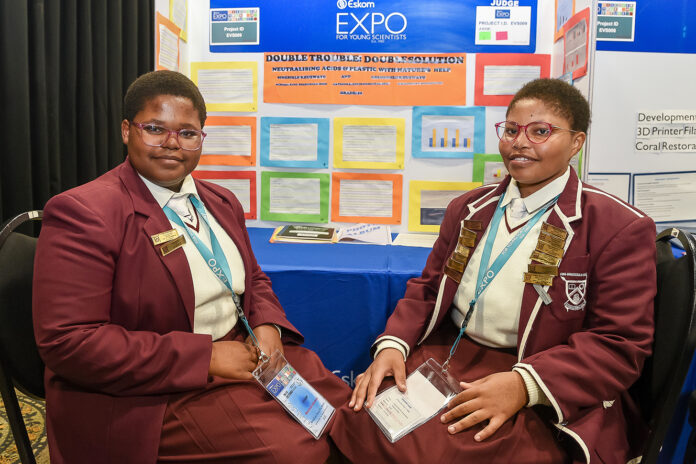Twin sisters Melokuhle and Simesihle Khuzwayo of Nongoma, in northern KwaZulu-Natal, have proven that innovation can sprout even from something as mundane as a banana peel.
The Grade 12 pupils from King Bhekuzulu High School impressed judges at the Eskom Expo International Science Fair with their project, “Double Trouble Double Solution: Neutralising Acid & Plastics with Nature’s Help”.
Their eco-driven research used banana peels and yeast to create an autolysed biomass extract (ABE) capable of neutralising acidic wastewater and removing microplastics. The experiment, inspired by a change in the colour of leaves in their home garden, began as a curiosity but evolved into a groundbreaking environmental solution for rural communities.
“Being recognised nationally and internationally at the Eskom Expo is the best feeling ever,” said Melokuhle. “It shows that our hard work paid off and that our research can have an impact in the future.”
The twins told Sunday World that teamwork was their secret weapon. “One of us focused on the research, while the other wrote everything down,” said Simesihle. “We shared the same goal, which meant fewer arguments and more collaboration.”
Balancing their matric studies and scientific research was their biggest challenge. “As matric learners, we had to manage our school work and the project simultaneously. We often found ourselves working late, but dedication pushed us to finish what we started,” they said.
Their natural sciences teacher, Nondumiso Zulu, described the sisters as determined and disciplined pupils whose passion for science had grown over the years of their participation in the Eskom Expo.
“They’ve been participating since Grade 9,” said Zulu. “That early start taught them how to conduct research, think critically, and present confidently. Their success shows our learners that science isn’t just for the gifted – it’s for those who are willing to put in the work.”
The Khuzwayo twins’ research comes at a time when South Africa continues to push for innovation in environmental protection and water purification. Their project’s use of banana peels and yeast as low-cost, natural resources offers a model that could be replicated in under-resourced communities facing pollution and water scarcity.
Eskom has awarded the sisters full bursaries covering tuition, accommodation, meals and textbooks for tertiary studies in science, technology, engineering or mathematics.
Mologadi Motshele, acting chief executive officer of the Eskom Development Foundation, said: “Eskom is incredibly proud of the young scientists who have participated in the Eskom Expo initiative this year, gaining valuable knowledge, skills, and insights as they explore the dynamic fields of science, technology, engineering, mathematics, and innovation (Stem).”
She said each year, thousands of pupils benefit from the Eskom Expo, gaining access to opportunities that would otherwise be out of reach.
“We encourage other like-minded school learners to take an interest in this initiative and consider pursuing careers in Stem fields. By doing so, they can become the architects of a brighter and more prosperous South Africa for future generations,” she said.
A total of 30 gold, 77 silver, and 131 bronze medals were awarded at the ceremony. The opportunity to represent South Africa at major international science fairs in Taiwan, Tunisia, China, Indonesia, the USA and Türkiye will be announced soon.
Eskom Expo executive director Parthy Chetty also praised the winners: “We extend our heartfelt congratulations to the brilliant winners of the International Science Fair. Your ingenuity, perseverance, and passion for discovery inspire us all…
“To students everywhere,” Chetty added, “let this be your spark. Stem subjects open doors to solving global challenges, shaping the future, and making a lasting impact.”



